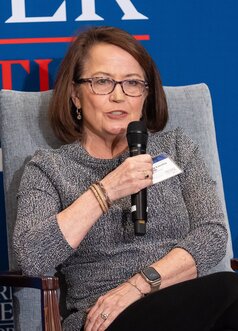
A Conversation with Chief Justice Loretta H. Rush of the Indiana Supreme Court
The chief justice talked about the Indiana’s lawyer shortage and the importance of judges getting out into their communities.
In February 2024, the Brennan Center for Justice, State Court Report, and the NYU Law Review hosted a symposium dedicated to state constitutional law. Several state supreme court justices who participated in the program sat down for brief interviews with State Court Report, which we are publishing as a series.
Chief Justice Loretta H. Rush has served on the Indiana Supreme Court for over a decade. In her interview, Rush discussed issues facing the people whose cases come before the judiciary — including substance abuse, inability to afford attorneys, and the lack of access to transportation to court.

Can you describe your career path?
I was a civil litigator and a partner at law firm for sixteen years before I became a juvenile court judge for thirteen years. I had a real interest in kids who were in the system. But at the time, Indiana was one of only two states in the country that didn’t have a woman on their supreme court. So I applied to be a state supreme court justice and was appointed by the governor in 2012. In 2014, I became the chief justice of the court. My philosophy is, whatever you do, ask yourself how you can do it better. I’ve always been interested in doing a better job.
What do you enjoy about being a judge in state court?
I love the state courts. Ninety-eight percent of the cases in the country are resolved in state courts. And they have become sort of our government’s emergency rooms for society’s worst afflictions, such as substance abuse, mental illness, domestic violence, homelessness. I also love that part of our constitutional responsibility on a state supreme court is overseeing the entire judiciary.
In Indiana, we have around 6.8 million people and more than 1.2 million cases filed each year. We’re dealing with things from child support, evictions, guardianships, and adoptions to contract disputes and criminal matters. So many issues that are just core to a person’s life.
What is your responsibility when you are behind the bench facing all these societal ills? You’ve got to train your judges on mental health. You’ve got to look at pretrial reform. Twenty-five years ago, only twenty-five percent of the people in jail were being held pretrial. Now it’s seventy-five percent. That means that most people in jail today haven’t been convicted yet — they just can’t afford bail. We have a wealth-based bail system.
You’ve got to start fixing things within the judiciary that bring people down. You see people with transportation issues and have trouble getting to court; seventy percent of people in jails have mental health or substance abuse issues. You’re seeing more and more low-and-middle-income people who can’t afford lawyers, so their needs go unmet.
What can you do to improve the lives of the people that come before you? Sometimes it’s not just deciding the case. It’s working within your larger community to make sure resources are there. We’ve tripled our problem-solving courts in Indiana — mental health, substance abuse, and veterans’ courts. We also have family recovery courts now, which allow children to stay with their parents while they go through recovery.
I always tell my judges, “Get out from behind the bench and work to make your community stronger.” I chaired a national opioid task force where I learned what levers the courts can pull regarding the behavioral health challenges that bring people to court. The primary referral source to get somebody to treatment is the criminal justice system.
Are there any initiatives you’re working on that you’d like to highlight?
I’m on a national task force for legal education and mission reform. We are dealing with attorney shortages throughout the country and how we’re addressing that shortage. We’re also trying to figure out what do we do with counties in Indiana that don’t have enough lawyers to run for judge, prosecutor, or public defender. That’s a real access-to-justice issue.
We’re considering solutions like issuing limited licenses to practice law or licensing paralegals. We are also considering supporting more online law schools and non-lawyer ownership of law firms. Those are all potential ways to ensure more people get the legal help they need.
Another idea is a loan forgiveness program if you practice law in a rural community. South Dakota and a couple of other states have programs like that. We’re just beginning to look at these options.
What is something people might not know about the Indiana Constitution?
Our first constitution was drafted in eleven days, which I find amazing. That just shows the independent fervor those frontiersmen had at the time.
Our constitution grants appellate courts the independent ability to review and revise a sentence. If a criminal defendant’s sentence is too high, the constitution explicitly grants us the authority to adjust it.
Are there issues or cases where the Indiana Supreme Court has diverged from federal courts?
Yes, lots of them. We’ve got some really good cases in Indiana with regard to search and seizure. We’ve got a different standard when it comes to speedy trial dates. And we diverged from some federal courts in holding that the compelled production of a password to a smartphone is testimonial and entitled to Fifth Amendment protection.
We also had a revenge-porn case where our court actually found fewer protections in our state constitution than would be found under the federal Constitution. If people bring a state constitutional claim that we’re able to rule on, it would always be my preference to rule on the state claims first.
Gabriella Sanchez is a staff writer and editor at the Brennan Center for Justice.
Suggested Citation: Gabriella Sanchez, A Conversation with Chief Justice Loretta H. Rush of the Indiana Supreme Court, Sᴛᴀᴛᴇ Cᴏᴜʀᴛ Rᴇᴘᴏʀᴛ (Jun. 12, 2024), https://statecourtreport.org/our-work/analysis-opinion/conversation-chief-justice-loretta-h-rush-indiana-supreme-court.



Related Commentary
A Conversation with Michigan Supreme Court Justice Elizabeth Welch
Welch discusses the challenges of artificial intelligence, Michigan’s protection of natural resources, and the potential value in career disappointments.
The Next Wave of Legislative Assaults on State Courts
Utah’s rush to add seats to its supreme court signals a major escalation in legislative tactics to curb judicial independence.
A Conversation with Wisconsin Supreme Court Justice Rebecca Frank Dallet
Dallet discussed equal access to justice, challenges to the rule of law, and her commitment to getting the law right.
Who’s Hiring State Supreme Court Clerks?
State-by-state information to aid law students and young attorneys in securing a state clerkship.